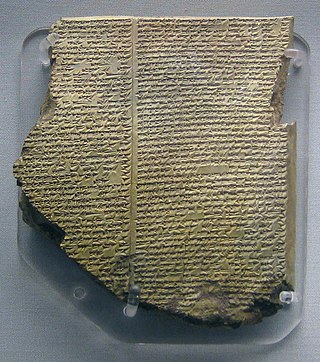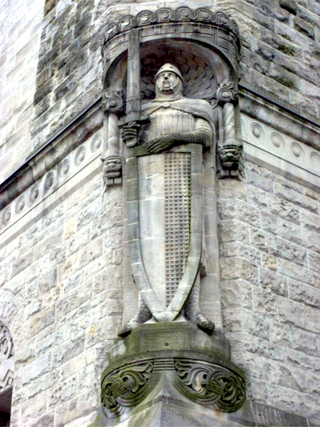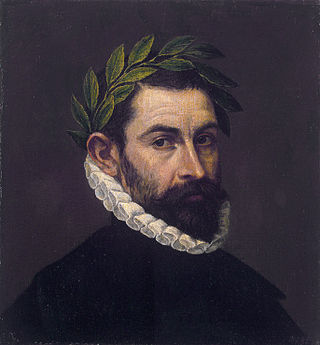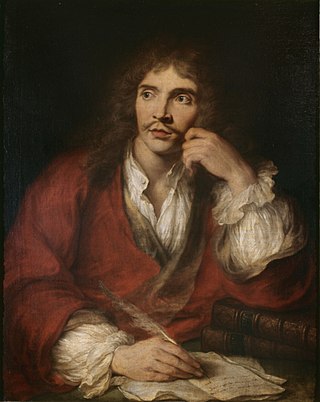
An epic poem, or simply an epic, is a lengthy narrative poem typically about the extraordinary deeds of extraordinary characters who, in dealings with gods or other superhuman forces, gave shape to the mortal universe for their descendants.
Poetry is a form of literary art that uses aesthetic and often rhythmic qualities of language to evoke meanings in addition to, or in place of, literal or surface-level meanings. Any particular instance of poetry is called a poem and is written by a poet. Poets use a variety of techniques called poetic devices, such as assonance, alliteration, euphony and cacophony, onomatopoeia, rhythm, and sound symbolism, to produce musical or other artistic effects. Most written poems are formatted in verse: a series or stack of lines on a page, which follow a rhythmic or other deliberate structure. For this reason, verse has also become a synonym for poetry.

Modern lyric poetry is a formal type of poetry which expresses personal emotions or feelings, typically spoken in the first person. The term for both modern lyric poetry and modern song lyrics derives from a form of Ancient Greek literature, the Greek lyric, which was defined by its musical accompaniment, usually on a stringed instrument known as a kithara, a seven-stringed lyre . It is not equivalent to song lyrics, though song lyrics are often in the lyric mode, and it is also not equivalent to Ancient Greek lyric poetry, which was principally limited to song lyrics, or chanted verse.

Roland was a Frankish military leader under Charlemagne who became one of the principal figures in the literary cycle known as the Matter of France. The historical Roland was military governor of the Breton March, responsible for defending Francia's frontier against the Bretons. His only historical attestation is in Einhard's Vita Karoli Magni, which notes he was part of the Frankish rearguard killed in retribution by the Basques in Iberia at the Battle of Roncevaux Pass.
Claudius Claudianus, known in English as Claudian, was a Latin poet associated with the court of the Roman emperor Honorius at Mediolanum (Milan), and particularly with the general Stilicho. His work, written almost entirely in hexameters or elegiac couplets, falls into three main categories: poems for Honorius, poems for Stilicho, and mythological epic.
Poetry took numerous forms in medieval Europe, for example, lyric and epic poetry. The troubadours, trouvères, and the minnesänger are known for composing their lyric poetry about courtly love usually accompanied by an instrument.

The chanson de geste is a medieval narrative, a type of epic poem that appears at the dawn of French literature. The earliest known poems of this genre date from the late 11th and early 12th centuries, shortly before the emergence of the lyric poetry of the troubadours and trouvères, and the earliest verse romances. They reached their highest point of acceptance in the period 1150–1250.
A cantar de gesta is the Spanish equivalent of the Old French medieval chanson de geste or "songs of heroic deeds".

Alonso de Ercilla y Zúñiga was a Spanish soldier and poet, born in Madrid. While in Chile (1556–63) he fought against the Araucanians (Mapuche), and there he began the epic poem La Araucana, considered one of the greatest epics of the Spanish Golden Age. This heroic work in 37 cantos is divided into three parts, published in 1569, 1578, and 1589. It celebrates both the violence of the conquistadors and the courage of the Araucanians.
This article concerns poetry in Spain.
French poetry is a category of French literature. It may include Francophone poetry composed outside France and poetry written in other languages of France.

Medieval French literature is, for the purpose of this article, Medieval literature written in Oïl languages during the period from the eleventh century to the end of the fifteenth century.

The Harivamsa is an important work of Sanskrit literature, containing 16,374 shlokas, mostly in the anustubh metre. The text is also known as the Harivamsa Purana. This text is believed to be a khila to the Mahabharata and is traditionally ascribed to Vyasa. The most celebrated commentary of the Mahabharata by Neelakantha Chaturdhara, the Bharata Bhava Deepa also covers the Harivamsa. According to a traditional version of the Mahabharata, the Harivamsa is divided into two parvas (books) and 12,000 verses. These are included with the eighteen parvas of the Mahabharata. The Critical Edition has three parvas and 5,965 verses.
Dodecasyllable verse is a line of verse with twelve syllables. 12 syllable lines are used in a variety of poetic traditions.
Decasyllable is a poetic meter of ten syllables used in poetic traditions of syllabic verse. In languages with a stress accent, it is the equivalent of pentameter with iambs or trochees.
This is a glossary of poetry terms.
The octosyllable or octosyllabic verse is a line of verse with eight syllables. It is equivalent to tetrameter verse in trochees in languages with a stress accent. Its first occurrence is in a 10th-century Old French saint's legend, the Vie de Saint Leger; another early use is in the early 12th-century Anglo-Norman Voyage de saint Brendan. It is often used in French, Italian, Spanish and Portuguese poetry. While commonly used in couplets, typical stanzas using octosyllables are: décima, some quatrains, redondilla.

The Mocedades de Rodrigo is an anonymous Castilian cantar de gesta, composed around 1360, that relates the origins and exploits of the youth of the legendary hero El Cid.

Albanian epic poetry is a form of epic poetry created by the Albanian people. It consists of a longstanding oral tradition still very much alive. A good number of Albanian epic singers can be found today in Kosovo and northern Albania, and some also in Montenegro. The Albanian traditional singing of epic verse from memory is one of the last survivors of its kind in modern Europe, and the last survivor of the Balkan traditions.

The French alexandrine is a syllabic poetic metre of 12 syllables with a medial caesura dividing the line into two hemistichs (half-lines) of six syllables each. It was the dominant long line of French poetry from the 17th through the 19th century, and influenced many other European literatures which developed alexandrines of their own.









